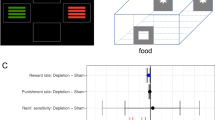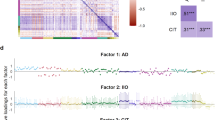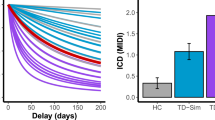Abstract
Convergent results from animal and human studies suggest that reducing serotonin neurotransmission promotes impulsive behavior. Here, serotonin depletion was induced by the dietary tryptophan depletion procedure (TD) in healthy volunteers to examine the role of serotonin in impulsive action and impulsive choice. We used a novel translational analog of a rodent 5-choice serial reaction time task (5-CSRTT)— the human 4-CSRTT—and a reward delay-discounting questionnaire to measure effects on these different forms of ‘waiting impulsivity’. There was no effect of TD on impulsive choice as indexed by the reward delay-discounting questionnaire. However, TD significantly increased 4-CSRTT premature responses (or impulsive action), which is remarkably similar to the previous findings of effect of serotonin depletion on rodent 5-CSRTT performance. Moreover, the increased premature responding in TD correlated significantly with individual differences on the motor impulsivity subscale of the Barratt Impulsivity Scale. TD also improved the accuracy of performance and speeded responding, possibly indicating enhanced attention and reward processing. The results suggest: (i) the 4-CSRTT will be a valuable addition to the tests already available to measure impulsivity in humans in a direct translational analog of a test extensively used in rodents; (ii) TD in humans produces a qualitatively similar profile of effects to those in rodents (ie, enhancing premature responding), hence supporting the conclusion that TD in humans exerts at least some of its effects on central serotonin; and (iii) this manipulation of serotonin produces dissociable effects on different measures of impulsivity, suggesting considerable specificity in its modulatory role.
Similar content being viewed by others
Log in or create a free account to read this content
Gain free access to this article, as well as selected content from this journal and more on nature.com
or
References
Aichret DS, Wostmann NM, Costa A, Macare C, Wenig JR, Moller HJ et al (2012). Associations between trait impulsivity and prepotent response inhibition. J Clin Exp Neuropsychol 34: 1016–1032.
Ardis TC, Cahir M, Elliott JJ, Bell R, Reynolds GP, Cooper SJ (2009). Effect of acute tryptophan depletion on noradrenaline and dopamine in the rat brain. J Psychopharmacol 23: 51–55.
Baarendse PJ, Vanderschuren LJ (2012). Dissociable effects of monoamine reuptake inhibitors on distinct froms of impulsive behaviours in rats. Psychopharmacology 219: 313–326.
Beck AT, Steer RA, Ball R, Ranieri W (1996). Comparison of Beck Depression Inventories -IA and -II in psychiatric outpatients. J Pers Assess 67: 588–597.
Belin D, Mar AC, Dalley JW, Robbins TW, Everitt BJ (2008). High impulsivity predicts the switch to compulsive cocaine-taking. Science 320: 1352–1355.
Benjamini Y, Drai D, Elmer G, Kafkafi N, Golani I (2001). Controlling the false discovery rate in behavior genetics research. Behav Brain Res 125: 279–284.
Biggio G, Fadda F, Fanni P, Tagliamonte A, Gessa GL (1974). Rapid depletion of serum tryptophan, brain tryptophan, serotonin and 5-hydroxyindoleacetic acid by a tryptophan-free diet. Life Sci 14: 1321–1329.
Bright P, Jaldow E, Kopelman MD (2002). The National Adult Reading Test as a measure of premorbid intelligence: a comparison with stimates derived from demographic variables. J Int Neuropsychol Soc 8: 847–854.
Broos N, Schmaal L, Wiskerke J, Kostelijk L, Lam T, Stoop N et al (2012). The Relationship between Impulsive Choice and Impulsive Action: A Cross-Species Translational Study. Plos One 7: e36781.
Carpenter LL, Anderson GM, Pelton GH, Gudin JA, Kirwin PD, Price LH et al (1998). Tryptophan depletion during continuous CSF sampling in healthy human subjects. Neuropsychopharmacology 19: 26–35.
Clark L, Roiser JP, Cools R, Rubinsztein DC, Sahakian BJ, Robbins TW (2005). Stop signal response inhibition is not modulated by tryptophan depletion or the serotonin transporter polymorphism in healthy volunteers: implications for the 5-HT theory of impulsivity. Psychopharmacology 182: 570–578.
Cools R, Blackwell A, Clark L, Menzies L, Cox S, Robbins TW (2005). Tryptophan depletion disrupts the motivational guidance of goal-directed behavior as a function of trait impulsivity. Neuropsychopharmacology 30: 1362–1373.
Cox SM, Benkelfat C, Dagher A, Delaney JS, Durand F, Kolivakis T et al (2011). Effects of lowerd serotonin transmission on cocaine-induced striatal dopamine response: PET (11C)raclopride study in humans. Br J Psychiatry 199: 391–397.
Crockett MJ, Clark L, Robbins TW (2009). Reconciling the role of serotonin in behavioral inhibition and aversion: acute tryptophan depletion abolishes punishment-induced inhibition in humans. J Neurosci 29: 11993–11999.
Crockett MJ, Clark L, Roiser JP, Robinson OJ, Cools R, Chase HW et al (2012). Converging evidence for central 5-HT effects in acute tryptophan depletion. Mol Psychiatry 17: 121–123.
Dalley JW, Everitt BJ, Robbins TW (2011). Impulsivity, compulsivity, and top-down cognitive control. Neuron 69: 680–694.
Dalley JW, Theobald DE, Pereira EA, Li PM, Robbins TW (2002). Specific abnormalities in serotonin release in the prefrontal cortex of isolation-reared rats measured during behavioural performance of a task assessing visuospatial attention and impulsivity. Psychopharmacology (Berl) 164: 329–340.
Delgado MR, Jou RL, Ledoux JE, Phelps EA (2009). Avoiding negative outcomes: tracking the mechanisms of avoidance learning in humans during fear conditioning. Front Behav Neurosci 3: 33.
Donelly O, Holtzman T, Rich PD, Van Dijck G, Holzhammer T, Paul O et al (2012). High impulsivity is associated with altered fronto-striatal cross-frequency coupling and local field potential dynamics during performance of an attentional task. Soc Neurosci.
Eagle DM, Lehmann O, Theobald DE, Pena Y, Zakaria R, Ghosh R et al (2009). Serotonin depletion impairs waiting but not stop-signal reaction time in rats: implications for theories of the role of 5-HT in behavioral inhibition. Neuropsychopharmacology 34: 1311–1321.
Evenden JL (1999). Varieties of impulsivity. Psychopharmacology (Berl) 146: 348–361.
Fineberg NA, Potenza MA, Chamberlain SR, Berlin HA, Menzies L, Bechara A et al (2010). Probing Compulsive and Impulsive Behaviors, from Animal Models to Endophenotypes: A narrative Review. Neuropsychopharmacology 35: 591–604.
Fletcher PJ, Tampakeras M, Sinyard J, Higgins GA (2007). Opposing effects of 5-HT(2A) and 5-HT(2C) receptor antagonists in the rat and mouse on premature responding in the five-choice serial reaction time test. Psychopharmacology (Berl) 195: 223–234.
Harrison AA, Everitt BJ, Robbins TW (1997a). Central 5-HT depletion enhances impulsive responding without affecting the accuracy of attentional performance: interactions with dopaminergic mechanisms. Psychopharmacology (Berl) 133: 329–342.
Harrison AA, Everitt BJ, Robbins TW (1997b). Doubly dissociable effects of median- and dorsal-raphe lesions on the performance of the five-choice serial reaction time test of attention in rats. Behav Brain Res 89: 135–149.
Harrison AA, Everitt BJ, Robbins TW (1999). Central serotonin depletion impairs both the acquisition and performance of a symmetrically reinforced go/no-go conditional visual discrimination. Behav Brain Res 100: 99–112.
Homberg JR (2012). Serotonin and decision making processes. Neurosci Biobehav Rev 36: 723–738.
Kirby KN, Petry NM, Bickel WK (1999). Heroin addicts have higher discount rates for delayed rewards than non-drug-using controls. J Exp Psychol Gen 128: 78–87.
Kranz GS, Kasper S, Lanzenberger R (2010). Reward and serotonergic system. J Neurosci 166: 1023–1035.
Leerman RF, Potenza MN (2012). Similarities and differences between pathological gambling and substance use disorders: a focus on impulsivity and compulsivity. Psychopharmacology 219: 469–490.
LeMarquand DG, Benkelfat C, Pihl RO, Palmour RM, Young SN (1999). Behavioral disinhibition induced by tryptophan depletion in nonalcoholic young men with multigenerational family histories of paternal alcoholism. Am J Psychiatry 156: 1771–1779.
Miyazaki K, Kayoko KW, Doya K (2012). The role of serotonin in the regulation of patience and impulsivity. Mol Neurobiol 45: 213–224.
Odum AL (2011). Delay discounting: I’m a K, you're a K. J Exp Anal Behav 96: 427–439.
Paterson N, Wetzler C, Hackett A, Hanania T (2012). Impulsive action and impulsive choice are mediated by disctinct neuropharmacological substrates in rats. Int J Neuropsychopharmacol 15: 1473–1487.
Patton JH, Stanford JH, Barratt ES (1995). Factor strucutre of Barratt Impulsiveness Scale. J Clin Psychol 51: 768–774.
Robbins TW (2002). The 5-choice serial reaction time task: behavioural pharmacology and functional neurochemistry. Psychopharmacology (Berl) 163: 362–380.
Robbins TW, Gillan CM, Smith DG, de Wit S, Ersche KD (2012). Neurocognitive endophenotypes of impulsivity and compulsivity: towards dimensional psychiatry. Trends Cogn Sci 16: 81–91.
Sahakian BJ, Owen AM, Morant NJ, Eagger SA, Boddington S, Crayton L et al (1993). Further analysis of the cognitive effects of tetrahydroaminoacridine (THA) in Alzheimer's disease: assessment of attentional and mnemonic function using CANTAB. Psychopharmacology (Berl) 110: 395–401.
Scholes KE, Harrison BJ, O’Neill BV, Leung S, Croft RJ, Pipingas A et al (2007). Acute serotonin and dopamine depletion improves attentional control: findings from the stroop task. Neuropsychopharmacology 32: 1600–1610.
Seymour B, Daw ND, Roiser JD, Dayan P, Dolan R (2012). Serotonin selectively modulates reward value in human decision-making. J Neurosci 31: 5833–5842.
Sheehan DV, Lecrubier Y, Sheehan KH, Amorim P, Janavs J, Weiller E et al (1998). The Mini-International Neuropsychiatric Interview (M.I.N.I.): the development and validation of a structured diagnostic psychiatric interview for DSM-IV and ICD-10. J Clin Psychiatry 59 (Suppl 20): 22–33.
Spielberger CD (1989) State-Trait anxiety inventory 2nd edn, Consulting Psychologist Press: Palo Alto, CA.
van Donkelaar EL, Blokland A, Ferrington L, Kelly PA, Steinbusch HW, Prickaerts J (2011). Mechanism of acute tryptophan depletion: is it only serotonin? Mol Psychiatry 16: 695–713.
Voon V, Irvine MA, Derbyshire K, Worbe Y, Lange Y, Abbott S et al (2014). Measuring ‘waiting’ impulsivity in substance addictions and binge eating disorder in a novel analogue of rodent serial reaction time task. Biol Psychiatry 75: 148–155.
Ward BO, Wilkinson LS, Robbins TW, Everitt BJ (1999). Forebrain serotonin depletion facilitates the acquisition and performance of a conditional visual discrimination task in rats. Behav Brain Res 100: 51–65.
Winstanley CA, Dalley JW, Theobald DE, Robbins TW (2004a). Fractionating impulsivity: contrasting effects of central 5-HT depletion on different measures of impulsive behavior. Neuropsychopharmacology 29: 1331–1343.
Winstanley CA, Eagle DM, Robbins TW (2006). Behavioral models of impulsivity in relation to ADHD: translation between clinical and preclinical studies. Clin Psychol Rev 26: 379–395.
Winstanley CA, Theobald DE, Dalley JW, Glennon JC, Robbins TW (2004b). 5-HT2A and 5-HT2C receptor antagonists have opposing effects on a measure of impulsivity: interactions with global 5-HT depletion. Psychopharmacology (Berl) 176: 376–385.
Acknowledgements
This work was supported by a Wellcome Trust programme grant to TWR (089589/z/09/z). The Behavioural and Clinical Neuroscience Institute is jointly funded by the MRC and the Wellcome Trust (G00001354). We wish to thank Dr M Franklin (University of Oxford) for analysis of plasma data, Dr Sanja Abbott for the help with the computer programming of the human 4-CSRTT and Dr Mercedes Arroyo for the help with administrative support of the study. We thank Cambridge Bioresource for providing volunteers.
Author information
Authors and Affiliations
Corresponding author
Additional information
Supplementary Information accompanies the paper on the Neuropsychopharmacology website
Supplementary information
PowerPoint slides
Rights and permissions
About this article
Cite this article
Worbe, Y., Savulich, G., Voon, V. et al. Serotonin Depletion Induces ‘Waiting Impulsivity’ on the Human Four-Choice Serial Reaction Time Task: Cross-Species Translational Significance. Neuropsychopharmacol 39, 1519–1526 (2014). https://doi.org/10.1038/npp.2013.351
Received:
Revised:
Accepted:
Published:
Issue date:
DOI: https://doi.org/10.1038/npp.2013.351
Keywords
This article is cited by
-
Chronic escitalopram in healthy volunteers has specific effects on reinforcement sensitivity: a double-blind, placebo-controlled semi-randomised study
Neuropsychopharmacology (2023)
-
Serotonin regulation of behavior via large-scale neuromodulation of serotonin receptor networks
Nature Neuroscience (2023)
-
Inhibition of ventral tegmental area projections to the nucleus accumbens shell increases premature responding in the five-choice serial reaction time task in rats
Brain Structure and Function (2023)
-
Serotonin depletion impairs both Pavlovian and instrumental reversal learning in healthy humans
Molecular Psychiatry (2021)
-
Impulsive prepotent actions and tics in Tourette disorder underpinned by a common neural network
Molecular Psychiatry (2021)



